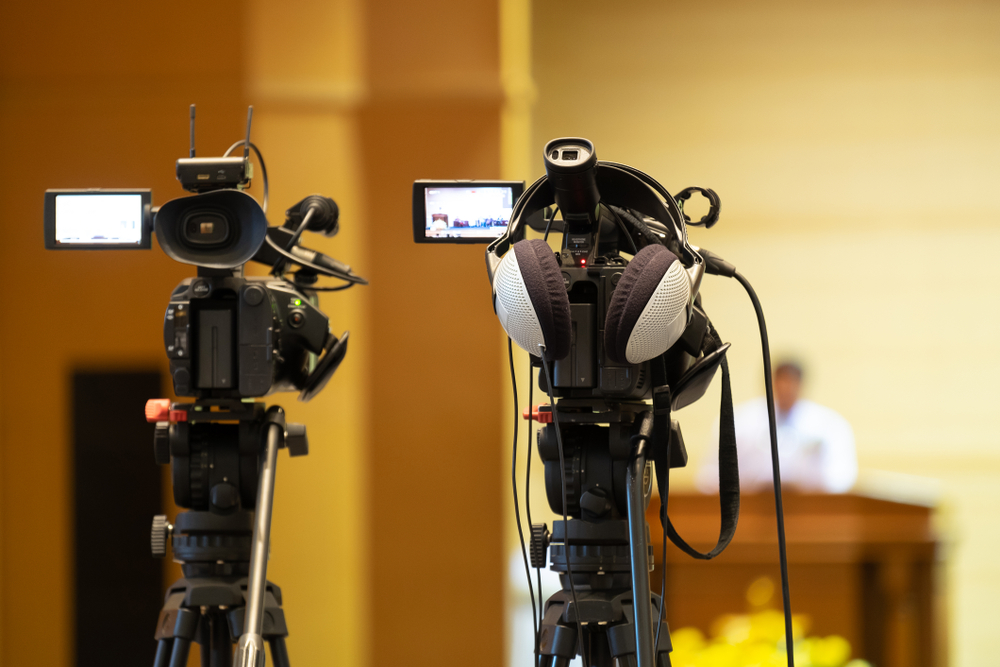The Significance of Lawful Video Depositions in Modern Legal Providers: What You Should Know
Lawful video depositions have come to be important in today's legal landscape. They give a multidimensional view of witness testimonies that traditional transcripts simply can not match. By catching both spoken and non-verbal interaction, these depositions improve the total understanding of a witness's trustworthiness. However, the efficiency of video clip depositions rests on numerous aspects, including compliance with legal requirements and ideal techniques (legal video depositions). Discovering these elements discloses their true significance in modern legal solutions
What Are Legal Video Clip Depositions?
Legal video clip depositions offer as an essential tool in the lawsuits procedure. They include recording witness testaments in a video clip layout, recording both non-verbal and spoken interaction. This approach permits lawyers to record the temperament, expressions, and responses of witnesses, giving a richer context for the testament. Normally carried out in a regulated setting, these depositions are led by lawyers who ask inquiries while a court press reporter documents the discussion. The resulting video can be critical for trial prep work, as it allows lawyers to assess the reliability of witnesses and improve their techniques. In addition, legal video clip depositions can be made use of in different lawful contexts, varying from civil disagreements to criminal instances. The aesthetic and auditory elements of video depositions improve the discussion of proof, making it a vital part in the modern-day legal landscape. Overall, they add significantly to the performance and effectiveness of legal process.

Advantages of Video Clip Depositions Over Standard Approaches
Video clip depositions provide many advantages contrasted to traditional techniques of taking witness testimonies. One significant advantage is the capability to record both audio and visual aspects, supplying a much more complete record of the witness's statements. This twin style boosts clarity and permits lawyers to reference specific subtleties during trial preparation. Furthermore, video depositions help with remote involvement, making it less complicated for witnesses who might be inaccessible for in-person appearances due to geographical restrictions or health issues.Moreover, video clip depositions can speed up the overall deposition process, reducing the time and expenses linked with traveling and logistics. They also enhance ease of access, as tape-recorded depositions can be conveniently shared among legal groups and referenced at any moment. This benefit contributes to far better case administration and preparation. Overall, video depositions stand for a modern, reliable strategy to gathering witness statements, straightening with the advancing demands of the lawful profession.
The Duty of Body Language and Tone in Testimonies

In legal video clip depositions, body movement and tone play crucial duties in communicating a witness's credibility and credibility. Nonverbal cues can provide insights right into a witness's mood, affecting just how their statement is perceived. Understanding the impact of these elements is important for lawyers and jurors alike when examining the integrity of a statement.
Nonverbal Communication Insights
While spoken interaction is typically emphasized in lawful testimonies, nonverbal signs such as body language and tone play an essential function in conveying reputation and feeling. Viewers of depositions may note that a witness's stance, motions, and faces can considerably affect perceptions of integrity. For instance, consistent eye get in touch with might indicate confidence, while preventing stare can suggest dishonesty or discomfort. Similarly, the intonation-- its pitch, pace, and volume-- can pass on feelings of sincerity or uncertainty. Lawyers have to be in harmony with these nonverbal signals, as they commonly give essential context that matches spoken words. Understanding these nuances can boost the effectiveness of depositions and affect the end result of lawful process.
Psychological Tone Influence
The emotional tone shared during lawful statements substantially impacts how a witness is regarded. Body movement, vocal inflections, and facial expressions play crucial roles in forming the narrative of a testimony. A witness displaying self-confidence via steady eye get in touch with and a calm tone can impart a feeling of reliability and interaction. Alternatively, signs of stress and anxiety, such as fidgeting or an unsteady voice, may result in uncertainty regarding their account. The nuances of emotional expression can affect the analysis of facts, making it crucial for lawyers to acknowledge these cues. In video depositions, the auditory and aesthetic parts incorporate, stressing the value of emotional tone in communicating sincerity and reliability within the lawful process.
Reliability and Trustworthiness
An important consider establishing reliability and dependability throughout testimonies depends on the witness's body movement and intonation. Observers typically rely upon non-verbal signs-- such as eye get in touch with, stance, and gestures-- to evaluate a witness's genuineness. As an example, a witness who maintains eye contact and displays open body movement might be regarded as more trustworthy and truthful than one that prevents eye call or shows up blocked. Additionally, tone of voice plays a necessary function; a consistent, tranquil tone can reinforce the reputation of the testament, while changes in pitch or quantity may raise questions. Eventually, the mix of body language and vocal tone significantly influences exactly how a witness's declarations are obtained and interpreted in a legal context.
Best Practices for Conducting Video Clip Depositions
Conducting video clip depositions requires cautious planning and implementation to guarantee a reliable and clear discussion of testament. Initially, it is important to select a peaceful, well-lit area to reduce interruptions and safe optimal video clip quality. The tools ought to be tested beforehand, including cameras, microphones, and lights, to prevent technological concerns during the deposition.Next, celebrations involved must review the format and treatments beforehand, making certain that every person recognizes their duties. The deponent ought to be oriented on the process, consisting of exactly how to respond clearly and concisely.Additionally, preserving a specialist behavior throughout the session is vital. This consists of avoiding from talking over one an additional and validating that all concerns are directed appropriately. Finally, it is crucial to tape-record the deposition in a style that enables for simple playback and testimonial, maintaining the stability find out this here of the statement for future use.
Lawful Factors To Consider and Conformity Issues
Just how do legal considerations and compliance issues impact the efficiency of video depositions? Attorneys have to navigate a complicated landscape of laws, making certain that video depositions abide by jurisdictional regulations and standards. Conformity with laws concerning personal privacy, approval, and tape-recording methods is essential. For instance, acquiring specific approval from all parties involved is needed to stay clear of legal repercussions.Additionally, the admissibility of video proof in court can depend upon conformity with step-by-step requirements. Guaranteeing that the devices utilized meets technological criteria is likewise crucial, as low quality can weaken the deposition's reliability.Moreover, attorneys must recognize any type of details state legislations that regulate video clip depositions, as these can differ considerably. Failure to resolve these considerations can not just endanger the honesty of the deposition yet likewise impact the general situation approach, ultimately impacting the client's legal results.
Exactly How Video Clip Depositions Impact Court Perception
While video depositions can act as powerful tools in lawful procedures, their influence on court understanding is substantial. The visual and acoustic components of video recordings offer jurors with a more comprehensive understanding of witness disposition, credibility, and emotional feedbacks. This multimedia approach can improve the jurors' capability to evaluate the reliability of statement contrasted to traditional text-based transcripts.Moreover, video clip depositions allow jurors to observe body movement, intonation, and face expressions, all of which article source can influence their interpretation of the witness's declarations. The presence of a witness on display can humanize them, fostering compassion and link, which might guide jurors' viewpoints. On the other hand, a witness who shows up unreliable or incredibly elusive on video clip may bring about adverse assumptions that affect a jury's decision. Ultimately, the dynamic nature of video clip depositions plays a crucial role in shaping just how jurors analyze evidence and reach their decisions.
The Future of Video Depositions in Legal Practice
As improvements in modern technology continue to improve the legal landscape, the future of video clip depositions is poised for substantial development. Technologies such as fabricated knowledge, digital fact, and enhanced video conferencing devices are anticipated to enhance the deposition process and boost availability. Lawyers may utilize AI-driven analytics to examine witness reputation and case strength extra effectively.Moreover, the assimilation of online fact can permit courts to experience immersive simulations of depositions, offering much deeper context and understanding. Additionally, the fad towards remote depositions is likely to persist, providing higher versatility for clients and lawyers alike.As remote job comes to be increasingly normalized, video clip depositions will likely come to be typical practice, reducing expenses and time restraints connected with traditional approaches. In general, these technological developments promise to improve the effectiveness, effectiveness, and access of video clip depositions in legal method, eventually transforming just how lawyers get ready for trial.
Often Asked Inquiries
Just How Much Do Lawful Video Clip Depositions Generally Cost?

Can Video Clip Depositions Be Made Use Of in Any Type Of Sort Of Instance?
Video depositions can Going Here be made use of in various kinds of instances, including civil, criminal, and family regulation. Their flexibility permits attorneys to existing witness statements efficiently, adjusting to the specific needs of various legal scenarios.
What Devices Is Needed for a Video Clip Deposition?
To perform a video deposition, essential devices consists of a premium electronic camera, microphone, lights, and a dependable recording device. Additionally, a computer system with editing and enhancing software may be necessary for post-production and formatting the last video.
How much time Does a Typical Video Deposition Last?
A typical video deposition lasts in between 2 to 4 hours, depending upon the intricacy of the situation and the number of questions presented. Extensive sessions might happen, however breaks are usually incorporated for participant convenience.

Are Video Clip Depositions Admissible in Court?
Video clip depositions are typically admissible in court, provided they stick to legal criteria and guidelines of evidence. Their usage improves quality and preserves witness testimony, assisting in the judicial procedure throughout tests and hearings. Legal video clip depositions have actually become crucial in today's lawful landscape. Furthermore, legal video depositions can be utilized in different legal contexts, ranging from civil conflicts to criminal cases. Additionally, video depositions promote remote participation, making it easier for witnesses who may be not available for in-person looks due to geographical restraints or health and wellness issues.Moreover, video clip depositions can accelerate the overall deposition procedure, decreasing the time and costs linked with travel and logistics. Guaranteeing that the devices used fulfills technical criteria is likewise essential, as inadequate quality can threaten the deposition's reliability.Moreover, attorneys have to be conscious of any kind of details state legislations that govern video clip depositions, as these can vary greatly. Furthermore, the fad toward remote depositions is most likely to continue, using better flexibility for clients and lawyers alike.As remote job becomes increasingly stabilized, video clip depositions will likely end up being basic practice, reducing expenses and time constraints associated with typical approaches.